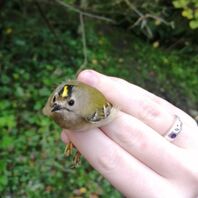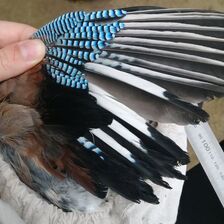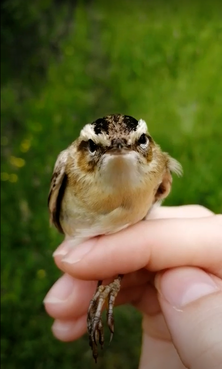
Alice Oswald
My research encompasses quantitative ecology, species conservation and policy. Particularly, my PhD research aims to estimate the abundance of the UK’s birds within the context of Favourable Conservation Status (FCS). FCS is a concept that aims for species to be thriving in the long term, an even more ambitious target than that of preventing species extinctions. Targets that state species should be in an FCS are written into EU law in the Habitats and Birds Directives. However, there is no quantitative methodology for determining the level at which we could consider a population size to be ‘favourable’. Therefore, the FCS definition is currently open to interpretation and requires an agreed-upon methodology. My PhD will explore methods for determining a favourable population size by using species distribution modelling to estimate current and alternative abundances of the UK’s birds. Results will hopefully allow me to understand what a ‘thriving’ population would look like for different species, and investigate what the practical implications are for this with regard to conservation policy and management. I am working with partner organisations Natural England (CASE partner) and the RSPB. Through these partnerships, I hope that my work will have a real-world implementation in species conservation policy. I am also interested in utilising citizen science and science communication skills as an aid to conservation research, which is something I love to engage with as both a scientist and citizen! Previously I worked in the Wildlife team at the RSPB, where I advised on lots of weird and wonderful nature-related queries and wrote for The RSPB Magazine. I am also a volunteer bird ringing trainee with the BTO which is great for getting outdoors in an otherwise desk-based role! This year (2023), I have taken up the responsibility of organising our weekly CEG and wider research group meetings. My hope is to maintain a positive and healthy research culture in an inclusive and supportive environment for everyone. Position: PhD Student
Supervised by: Prof. Stephen Willis, Prof. Philip Stephens, Prof. Philip McGowan (Newcastle University), Dr Gillian Gilbert (RSPB), Kate Jennings (RSPB) and Anna Millard (Natural England) Research groups: Conservation Ecology Group (Durham University) and Modelling Evidence and Policy Group (Newcastle University) Email: [email protected] Education
2019-2020, MSc Wildlife Management, Newcastle University 2015-2018, BSc Biology, Newcastle University |




